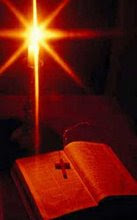"Now the names of the twelve apostles are these :
The first, Simon, who is called Peter, and Andrew his brother ; and James the
son of Zebedee, and John his brother ; Philip and Bartholomew ; Thomas and
Matthew the tax collector ; James the son of Alphaeus, and Thaddaeus ; Simon
the Zealot, and Judas Iscariot, the one who betrayed Him.." Matthew
10:2-4, Bible
"And when he had called unto him his twelve
disciples, he gave them power against unclean spirits, to cast them out, and to
heal all manner of sickness and all manner of disease.: Now the names of the
twelve apostles are these:...These twelve Jesus sent forth and commanded them,
saying, go not into the way of the Gentiles and into any city of the Samaritans
enter ye not: but go rather to the lost sheep of the house of Israel. And as ye
go preach saying 'The kingdom of heaven is at hand'"
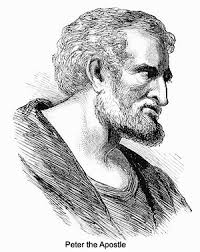 St. Peter, Prince of the Apostles
St. Peter, Prince of the Apostles
St. Peter's true and original name was Simon, sometimes
occurring in the form Symeon. (Acts 15:14; 2 Peter 1:1). He was the son of Jona
(Johannes) and was born in Bethsaida (John 1:42, 44), a town on Lake
Genesareth, the position of which cannot be established with certainty,
although it is usually sought at the northern end of the lake...
The Apostle Andrew
was his brother, and the Apostle Philip came from the same town...
Professional fisherman. Brother of Saint Andrew the
Apostle, the man who led him to Christ. Apostle. Renamed “Peter” (rock) by
Jesus to indicate that Peter would be the rock-like foundation on which the
Church would be built. Bishop. First Pope. Miracle worker...
Martyred c.64 in Rome, Italy crucified head downward
because he claimed he was not worthy to die in the same manner as Christ... Although,
just before the crucifixion, Peter denied three times that he even knew Christ,
after the resurrection he did not do so again. Peter, just as Jesus told him in
John 21:18-19, was crucified by Roman executioners because he could not deny
his master again. According to Eusebius, he thought himself unworthy to be
crucified as his Master, and, therefore, he asked to be crucified "head
downward."...
Prayer to Saint Peter ... O Glorious Saint Peter, because
of your vibrant and generous faith, sincere humility and flaming love our Lord
honored you with singular privileges and especially leadership of the whole
Church. Obtain for us the grace of a living faith, a sincere loyalty to the
Church, acceptance of all her teaching, and obedience to all her precepts. Let
us thus enjoy an undisturbed peace on earth and everlasting happiness in
heaven...
Date of Martyrdom: ca. 64 A.D...
Feastday: 29 June (feast of Peter and Paul); 22 February
(feast of the Chair of Peter, emblematic of the world unity of the Church); 1
August (Saint Peter in Chains); 18 November (feast of the dedication of the
Basilicas of Peter and Paul)...
Saint Peter the apostle among all other, and above all
other, was of most fervent and burning love, for he would have known the
traitor that should betray our Lord Jesu Christ, as Saint Austin saith: If he
had known him he would have torn him with his teeth, and therefore our Lord
would not name him to him, for as Chrysostom saith: If he had named him, Peter
had arisen and all to-torn him. Peter went upon the sea; he was chosen of God
to be at his transfiguration, and raised a maid from death to life; he found
the stater or piece of money in the fish’s mouth; he received of our Lord the
keys of the kingdom of heaven; he took the charge to feed the sheep of Jesu
Christ...
Out of the whole world one man, Peter, is chosen to
preside at the of all nations and to be set over all the apostles and all the
fathers of the church. Though there are in God’s people many bishops and many
shepherds, Peter is thus appointed to rule in his own person those whom Christ
also rules as the original ruler. Beloved, how great and wonderful is this
sharing in his power that God in his goodness has given to this man. Whatever
Christ has willed to be shared in common by Peter and the other leaders of the
Church, it is only through Peter that he has given to others what he has not
refused to bestow on them. Jesus said: “Upon this rock I will build my Church,
and the gates of hell shall not prevail against it.” On this strong foundation,
he says, I will build an everlasting temple. The great height of my Church,
which is to penetrate the heavens, shall rise on the firm foundation of this
faith. Blessed Peter is therefore told: “To you I will give the keys of the
kingdom of heaven. Whatever you bind on earth shall be bound also in heaven.
Whatever you loose on earth shall be loosed also in heaven.” ...
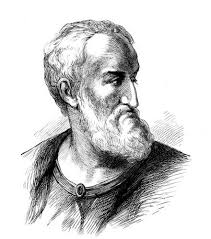 St. Andrew
St. Andrew
As one of the Twelve, Andrew was admitted to the closest
familiarity with Our Lord during His public life; he was present at the Last
Supper; beheld the risen Lord; witnessed the Ascension; shared in the graces
and gifts of the first Pentecost, and helped, amid threats and persecution, to
establish the Faith in Palestine...
St. Andrew, the Apostle, son of Jonah, or John (Matthew
16:17; John 1:42), was born in Bethsaida of Galilee (John 1:44). He was brother
of Simon (Peter) (Matthew 10:2; John 1:40). Both were fishermen (Matthew 4:18;
Mark 1:16), and at the beginning of Our Lord's public life occupied the same
house at Capharnaum (Mark 1:21, 29)...
The first Apostle. Fisherman by trade. Brother of Simon
Peter. Follower of John the Baptist. Andrew went through life leading people to
Jesus, both before and after the Crucifixion. Missionary in Asia Minor and
Greece, and possibly areas in modern Russia and Poland. Martyred on an saltire
(x-shaped) cross, he is said to have preached for two days from it...
Some peculiar marriage-related superstitions have
attached themselves to Saint Andrew’s feast day...
Andrew, who introduced his brother Peter to Christ, went
to join Peter with Christ in eternity six years after Peter's death. After
preaching Christ's resurrection to the Scythians and Thracians, he too was
crucified for his faith. As Hippolytus tells us, Andrew was hanged on an olive
tree at Patrae, a town in Achaia...
Date of Martyrdom: 70 A.D... crucified on a saltire
(x-shaped) cross in Greece...
Feastday: November 30...
After Andrew had stayed with Jesus and had learned much
from him, he did not keep this treasure to himself, but hastened to share it
with his brother Peter. Notice what Andrew said to him: “We have found the
Messiah, that is to say, the Christ.” Notice how his words reveal what he has
learned in so short a time. They show the power of the master who has convinced
them of this truth. Andrew’s words reveal a soul waiting with the utmost
longing for the coming of the Messiah, looking forward to his appearing from
heaven, rejoicing when he does appear, and hastening to announce to great an
event to others. To support one another in the things of the spirit is the true
sign of good will between brothers, loving kinship and sincere affection...
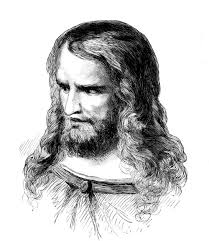 St. James the Greater
St. James the Greater
Apostle St James the Greater was son of Zebedee, a
fisherman of Galilee, and brother of John the Evangelist. He was among the
circle of men closest to Christ, being present with Peter and John at the
Transfiguration, and again at the Agony in the Garden, where the same three are
seen sleeping while Christ prays. He was tried in Jerusalem in the year 44 by
Herod Agrippa and executed...
James, the Apostle of the Lord, was the second recorded
martyr after Christ's death (Stephen was the first). His death is recorded in
Acts 12:2 where it is told that Herod Agrippa killed him with a sword. Clemens
Alexandrinus and Eusebius (Ecclesiastical History II.2) both tell how the
executioner witnessed the courage and un-recanting spirit of James and was then
convinced of Christ resurrection and was executed along with James...
Date of Martyrdom: 44-45 A.D... relics at Compostela,
Spain...A for the death of James, C- for the death of the executioner...
Memorial - 25 July, formerly 5 August ...
The cycle of scenes of his trial and execution is
represented in medieval frescoes and stained glass. The frescoes by Mantegna in
the Eremitani chapel, Padua, were destroyed in 1944. A series of legends dating
from the Middle Ages tells of his mission to Spain and burial at Compostella,
both historically untenable, though the latter became one of the great centres
of Christian pilgrimage. It is legend rather than Scripture that has been the
chief source of inspiration to artists, especially Spanish. James appears as
three distinct types:
- The Apostle. He
is of mature years, thin-bearded, his hair brown or dark, parted and falling on
either side in the manner of Christ. He holds the martyr's sword. In later
devotional art he holds the pilgrim's staff which usually distinguishes him
when grouped with other saints...
- The Pilgrim
(13th century onwards). He wears the pilgrim's broad-brimmed hat and cloak.
From his staff or shoulder hangs the wallet or water-gourd of the pilgrim. His
special attribute, the scallop shell, appears on his hat or cloak, or on the
wallet...
- The Knight and Patron Saint of Spain. He is mounted on
horseback holding a standard, and is dressed as a pilgrim or wears armour. His
horse tramples the Saracen under its hooves...
Apostle St James the Greater and Spain
The many Spanish legends about him, some of which are
represented in painting, date from about the 10th century and were probably
promulgated in order to encourage pilgrimage to Compostella. One tells of his
evangelizing mission to Spain after Christ's Ascension. In Saragossa the Virgin
appeared to him in a vision, seated on top of a pillar of jasper, and commanded
him to build a chapel on the spot, a story that served to explain the
foundation of the church of Nuestra Señora del Pilar. On his return to
Jerusalem he converted and baptized a magician, Hermogenes, after each had
tested his powers on the other, rather in the manner of the apostle Peter and
Simon Magus. After James' execution his disciples took his body back to Spain
and, guided by an angel, landed at Padron in Galicia. Near here, in the palace
of a pagan woman, Lupa, who was converted to Christianity by several miraculous
occurrences, James was buried. His supposed tomb was discovered in about the
9th century and the place was called Santiago (St James) de Compostella. It was
well-established as a place of pilgrimage by the 11th century, next in
importance to Jerusalem and Rome. The origin of the scallop shell as the badge
of the pilgrim to Compostella is open to more than one explanation...
The pilgrimage to his relics in Compostela became such a
popular devotion that the symbols of pilgrims have become his emblems, and he
became patron of pilgrims. His work in Spain, and the housing of his relics
there, led to his patronage of the country and all things Spanish; for
centuries, the Spanish army rode to battle with the cry “Santiago!” (“Saint
James!”)...
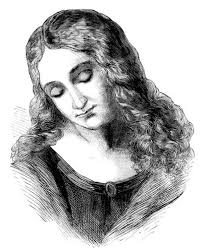 St. John the Evangelist
St. John the Evangelist
John was the son of Zebedee and Salome, and the brother
of James the Greater. In the Gospels the two brothers are often called after
their father "the sons of Zebedee" and received from Christ the
honourable title of Boanerges, i.e. "sons of thunder" (Mark 3:17).
Originally they were fishermen and fished with their father in the Lake of
Genesareth...
After the Resurrection John with Peter was the first of
the disciples to hasten to the grave and he was the first to believe that
Christ had truly risen (John, 2-10).
When later Christ appeared at the Lake of Genesareth John was also the first of
the seven disciples present who recognized his Master standing on the shore
(John, 7). The Fourth Evangelist has
shown us most clearly how close the relationship was in which he always stood
to his Lord and Master by the title with which he is accustomed to indicate
himself without giving his name: "the disciple whom Jesus loved"...
Christian tradition says that John the Evangelist was one
of Christ's original twelve apostles; the only one to live into old age; and
not killed for his faith. John the Evangelist is associated with Ephesus, where
he is said to have lived and been buried. Some believe that after a short life
he was exiled to (c.a. 95) Patmos, where he wrote the Book of Revelation.
However this is a matter of debate, with some attributing authorship to John of
Patmos or John the Presbyter. It is also debated whether John the Evangelist is
the same as St. John the Apostle...
John is the only one of the twelve Apostles to have died
a natural death. Although he did not die a martyr's death, he did live a
martyr's life. He was exiled to the Island of Patmos under the Emperor Domitian
for his proclamation of the risen Christ. It was there that he wrote the last
book in the Bible, Revelation. Some traditions tell us that he was thrown into
boiling oil before the Latin Gate, where he was not killed but undoubtedly
scarred for the rest of his life...
Date of Martyrdom: 95 A.D... c.101 at Ephesus (in modern
Turkey)...a church was built over his tomb, which was later converted to a
mosque...
Feastday: 27 December (Roman Catholic); 8 May (Greek
Orthodox); 6 May (before the Latin gate)...
St. John teaches us that to attain to this heavenly and
Christian disposition, to this twofold charity towards God and towards our
neighbour for his sake, we must subdue our passions and die to the inordinate
love of the world and ourselves. His hatred and contempt of the world was equal
to his love of God, and he cries out to us, "My little children, love not
the world, nor the things which are in the world. If anyone loves the world the
charity of the Father is not in him."...
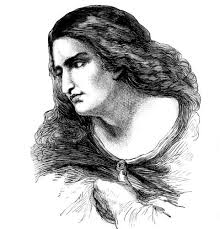 St. Philip
St. Philip
Philip was born in Bethsaida, Galilee... He may have been
a disciple of John the Baptist and is mentioned as one of the Apostles in the
lists of Matthew, Mark, Luke, and in Acts. Aside from the lists, he is
mentioned only in John in the New Testament. He was called by Jesus Himself and
brought Nathanael to Christ. Philip was present at the miracle of the loaves
and fishes, when he engaged in a brief dialogue with the Lord, and was the
Apostle approached by the Hellenistic Jews from Bethsaida to introduce them to
Jesus. Just before the Passion, Jesus answered Philip's query to show them the
Father...
Disciple of Saint John the Baptist. Convert. One of the
Twelve Apostle. Brought Saint Nathanael to Christ. Confidant of Jesus. Little
is known about him, but scriptural episodes give the impression of a shy,
naive, but practical individual. Preached in Greece and Asia Minor. Martyr...
Philip was corrected by Christ when he asked Christ to
“show us the Father, then this will be enough for us” (John 14:8). Christ
responded, “Have I been so long with you, and yet you have not come to know Me,
Philip? He who has seen Me has seen the Father; how can you say, ‘Show us the
Father ‘?” (John 14:9). Philip later saw the glory of Christ after the
resurrection and undoubtedly reflected with amazement on Christ's response to
his request. Philip evangelized in
Phrygia where hostile Jews had him tortured and then
crucified...
Date of Martyrdom: 54 A.D. ... martyred at
Hierapolis, Phrygia...
Feastday: May 3...
After our Lord's
ascension the gospel was to be preached to the whole world by a few persons, who
had been eye-witnesses of his miracles, and were enabled, by the power of the
Holy Ghost, to confirm their testimony concerning him by doing the like
wonderful works themselves. That this might be accomplished, it was necessary
that the disciples should quickly disperse themselves into all parts of the
world. St. Philip accordingly preached the gospel in the two Phrygias, as
Theodoret and Eusebius assure us from undoubted monuments. St. Polycarp, who
was only converted in the year 80, enjoyed his conversation for some time,4
consequently St. Philip must have lived to a very advanced age...
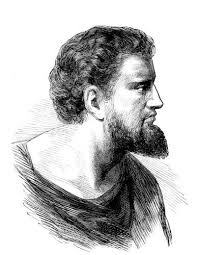 St. Bartholomew (Nathanael)
St. Bartholomew (Nathanael)
Many scholars identify him with Nathaniel (John ,45-51;
2). The manner of his death, said to have occurred at Albanopolis in Armenia, is
equally uncertain; according to some, he was beheaded, according to others,
flayed alive and crucified, head downward, by order of Astyages, for having
converted his brother, Polymius, King of Armenia. On account of this latter
legend, he is often represented in art (e.g. in Michelangelo's Last Judgment)
as flayed and holding in his hand his own skin...
Nathanael, whose name means "gift of God" was
truly given as a gift to the Church through his martyrdom. Nathanael was the
first to profess, early in Christ's ministry, that Christ was the Son of God
(John 1:49). He later paid for this profession through a hideous death.
Unwilling to recant of his proclamation of a risen Christ, he was flayed and
then crucified..
.
Date of Martyrdom: 70 A.D... flayed alive at Albanopolis, Armenia ... relics at Saint
Bartholomew-on-the-Tiber Church, Rome, Italy, and in the cathedral in
Canterbury, England..
Feastday: 24 August (Roman calendar); 11 June (Orthodox
calendar)..
All that is known of him with certainty is that he is
mentioned in the synoptic gospels and Acts as one of the twelve apostles. His
name, a patronymic, means "son of Tolomai" and scholars believe he is
the same as Nathanael mentioned in John, who says he is from Cana and that
Jesus called him an "Israelite...incapable of deceit." The Roman
Martyrology says he preached in India and Greater Armenia, where he was flayed
and beheaded by King Astyages. Tradition has the place as Abanopolis on the
west coast of the Caspian Sea and that he also preached in Mesopotamia, Persia,
and Egypt. The Gospel of Bartholomew is apochryphal and was condemned in the
decree of Pseudo-Gelasius...
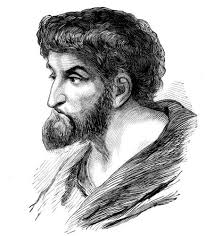 St. Thomas the Apostle
St. Thomas the Apostle
St. Thomas was a Jew, called to be one of the twelve
Apostles. He was a dedicated but impetuous follower of Christ. When Jesus said
He was returning to Judea to visit His sick friend Lazarus, Thomas immediately
exhorted the other Apostles to accompany Him on the trip which involved certain
danger and possible death because of the mounting hostility of the authorities.
At the Last Supper, when Christ told His Apostles that He was going to prepare
a place for them to which they also might come because they knew both the place
and the way, Thomas pleaded that they did not understand and received the
beautiful assurance that Christ is the Way, the Truth, and the Life. But St.
Thomas is best known for his role in verifying the Resurrection of his Master...
Thomas is known as "doubting Thomas" because of
his reluctance to believe the other Apostles' witness of the resurrection.
After they told him that Christ was alive, he stated "Except I shall see
in his hands the print of the nails, and put my finger
into the print of the nails, and thrust my hand into his side, I will not
believe" (John 20:25). After this, Christ did appear to him and Thomas
believed unto death. Thomas sealed his testimony as he was thrust through with
pine spears, tormented with red-hot plates, and burned alive...
Date of Martyrdom: 72 A.D... stabbed with a spear c.72 in
while in prayer on a hill in Mylapur, India; buried near the site of his death;
relics later moved to Edessa, Mesopotamia; relics moved to Ortona, Italy in the
13th century...
Feastday:3 July...
He was ready to die with Jesus when Christ went to
Jerusalem, but is best remembered for doubting the Resurrection until allowed
to touch Christ’s wounds. Preached in Parthia, Persia and India, though he was
so reluctant to start the mission that he had to be taken into slavery by a
merchant headed that way. He eventually gave in to God‘s will, was freed, and
planted the new Church over a wide area. He formed many parishes and built many
churches along the way. An old tradition says that Thomas baptised the wise men
from the Nativity into Christianity...
His symbol is the builder’s square; there are several
stories that explain it
- he built a palace for King Guduphara in India...
- he built the first church in India with his own
hands...
- it is representative building a strong spiritual
foundation as he had complete faith in Christ (though initially less in the
Resurrection)...
- he offered to build a palace for an Indian king that
would last forever; the king gave him money, which Thomas promptly gave away to
the poor; he explained that the palace he was building was in heaven, not on earth...
 St. Matthew
St. Matthew
Apostle and evangelist... The name Matthew is derived
from the Hebrew Mattija, being shortened to Mattai in post-Biblical Hebrew... Matthew, the son of Alpheus (Mark 2:14) was a Galilean,
although Eusebius informs us that he was a Syrian. As tax-gatherer at
Capharnaum, he collected custom duties for Herod Antipas, and, although a Jew,
was despised by the Pharisees, who hated all publicans. When summoned by Jesus,
Matthew arose and followed Him and tendered Him a feast in his house, where
tax-gatherers and sinners sat at table with Christ and His disciples...
When summoned by Jesus, Matthew arose and followed Him
and tendered Him a feast in his house, where tax-gatherers and sinners sat at
table with Christ and His disciples. This drew forth a protest from the
Pharisees whom Jesus rebuked in these consoling words: "I came not to call
the just, but sinners"...
Matthew, the tax collector, so desperately wanted the
Jews to accept Christ. He wrote The Gospel According to Matthew about ten years
before his death. Because of this, one can see, contained within his Gospel,
the faith for which he spilled his blood. Matthew surely remembered his
resurrected Savior's words, "Lo, I am with you always, even unto the end
of the world" (Matt. 28:20), when he professed the resurrected Christ unto
his death by beheading at Nad-Davar...
Date of Martyrdom: 60-70 A.D.
The Latin Church celebrates the feast of St. Matthew on
21 September, and the Greek Church on 16 November...
St. Matthew is
represented under the symbol of a winged man, carrying in his hand a lance as a
characteristic emblem...
Matthew’s Gospel is given pride of place in the canon of
the New Testament, and was written to convince Jewish readers that their
anticipated Messiah had come in the person of Jesus. He preached among the Jews
for 15 years; his audiences may have included the Jewish enclave in Ethiopia,
and places in the East...
 St. James the Lesser
St. James the Lesser
James, the son of Alpheus, Apostle (Matthew 10:3; Mark
3:18; Luke 6:15; Acts 1:13.)...
St. James the Less, the author of the first Catholic
Epistle, was the son of Alphaeus of Cleophas. His mother Mary was either a
sister or a close relative of the Blessed Virgin, and for that reason,
according to Jewish custom, he was sometimes called the brother of the Lord.
The Apostle held a distinguished position in the early Christian community of
Jerusalem. St. Paul tells us he was a witness of the Resurrection of Christ; he
is also a "pillar" of the Church, whom St. Paul consulted about the Gospel...
James was appointed to be the head of the Jerusalem
church for many years after Christ's death. In this, he undoubtedly came in
contact with many hostile Jews (the same ones who killed Christ and stated
"His [Christ's] blood be on us and our children" (Matt. 27:25). In
order to make James deny Christ's resurrection, these men positioned him at the
top of the Temple for all to see and hear. James, unwilling to deny what he
knew to be true, was cast down from the Temple and finally beaten to death with
a fuller's club to the head...
Date of Martyrdom: 62 A.D... martyred c.62 at Jerusalem by being thrown from a
pinnacle of the Temple, then stoned and beaten with clubs, including fuller‘s
mallets, while praying for his attackers...
Feastday: May 3...
Cousin of Jesus. Brother of Saint Jude Thaddeus. Raised
is a Jewish home of the time with all the training in Scripture and Law that
was part of that life. Convert. One of the Twelve Apostles. One of the first to
have visions of the risen Christ. First Bishop of Jerusalem. Met with Saint
Paul the Apostle to work out Paul‘s plans for evangelization. Supported the
position that Gentile converts did not have to obey all Jewish religious law,
though he continued to observe it himself as part of his heritage, may have
been a vegetarian. A just and apostolic man known for his prayer life and
devotion to the poor. Martyr...
Having been beaten to death, a club almost immediately
became his symbol. This led to his patronage of fullers and pharmacists, both
of whom use clubs in their professions. He is reported to have spent so much
time in prayer that his knees thickened, and looked like a camel’s. Soon after
the Crucifixion, James said he would fast until Christ returned; the
resurrected Jesus appeared to him, and fixed a meal for James Himself...
 St. Jude Thaddaeus
St. Jude Thaddaeus
St. Jude, known as Thaddaeus, was a brother of St. James
the Less, and a relative of Our Saviour. St. Jude was one of the 12 Apostles of
Jesus...
Ancient writers tell us that he preached the Gospel in
Judea, Samaria, Idumaea, Syria, Mesopotamia, and Lybia. According to Eusebius,
he returned to Jerusalem in the year 62, and assisted at the election of his
brother, St. Simeon, as Bishop of Jerusalem...
Judas questioned the Lord: "Judas said to him (not
Iscariot), Lord, how is it that you will show yourself to us, and not unto the
world?" (John 14:22). After he witnessed Christ's resurrection, Judas then
knew the answer to his question. Preaching the risen Christ to those in
Mesopotamia in the midst of pagan priests, Judas was beaten to death with
sticks, showing to the world that Christ was indeed Lord and God...
Date of Martyrdom: 72 A.D... beaten to death with a club,
then beheaded post-mortem in 1st century Persia; relics at Saint Peter’s
Basilica, Rome, Italy, at Rheims, France, and at Toulouse, France..
Feastday: 28 October (Roman Church); 19 June (Eastern
Church)...
Son of Cleophas, who died a martyr, and Mary who stood at
the foot of the Cross, and who annointed Christ’s body after death. Brother of
Saint James the Lesser. Nephew of Mary and Joseph; blood relative of Jesus
Christ, and reported to look a lot like him. May have been a fisherman.
Apostle...
Wrote the canonical Epistle named for him. Preached in
Syria, Mesopotamia, and Persia with Saint Simon. Healer. Exorcist. Could
exorcise pagan idols, which caused the demons to flee and the statues to
crumble...
His patronage of lost or impossible causes traditionally
derives from confusion by many early Christians between Jude and the traitor
Judas Iscariot; not understanding the difference between the names, they never
prayed for Jude’s help, and devotion to him became something of a lost cause...
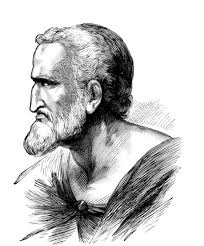 St. Simon the Apostle
St. Simon the Apostle
In the New Testament he is sometimes called Simon the
Zealot because of the zeal he showed for the Mosaic law which he practised
before his call...
Called the Cananean or Zealot because of his zeal for the
Jewish law; he was not from Cana, nor a member of the Zealot party. Like all
the Apostles, he was a convert, and was trained by Saint Peter the Apostle.
Evangelized in Egypt and Mesopotamia, though there are traditions of him being
in several other locations. He was a martyr for the faith, but several places
claim to have been the site of that, too...
Simon was a Jewish zealot who strived to set his people
free from Roman oppression. After he saw with his own eyes that Christ had been
resurrected, he became a zealot of the Gospel. Historians tell of the many
different places that Simon proclaimed the good news of Christ's
resurrection: Egypt, Cyrene, Africa, Mauritania, Britain,
Lybia, and Persia. His rest finally came when he verified his testimony and
went to be with Christ, being crucified by a governor in Syria...
Date of Martyrdom: 74 A.D...martyred; Abyssinians claim
he was crucified in Samaria; Lipsius says he was sawn in half at Suanir,
Persia; Moses of Chorene writes that he was martyred at Weriosphora in Iberia;
many locations claim to have relics including Toulouse, France, and Saint
Peter’s Basilica, Rome, Italy...
Feastday: 28 October (Roman Church); 10 May (Coptic
Church)...
St Simon is surnamed the Canaanean or Canaanite, and the
Zealot, to distinguish him from St. Peter, and from St. Simeon, the brother of
St. James the Less, and his successor in the see of Jerusalem. From the first
of these surnames some have thought that St. Simon was born at Cana, in
Galilee: certain modern Greeks pretend that it was at his marriage that our
Lord turned the water into wine. It is not to be doubted but he was a Galilean.
Theodoret says, of the tribe either of Zabulon or Nepthali. Hammond and Grotius
think that St. Simon was called the Zealot, before his coming to Christ,
because he was one of that particular sect or party among the Jews called
Zealots, from a singular zeal they possessed for the honour of God and the
purity of religion. A party called Zealots were famous in the war of the Jews
against the Romans...
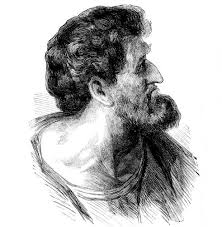 Judas Iscariot
Judas Iscariot
“...Judas Iscariot, the one who betrayed Him.."
Judas Iscariot - was, according to the New Testament, one
of the Twelve Apostles of Jesus. He is infamously known for his kiss and
betrayal of Jesus to the hands of the chief Sanhedrin priests for a ransom of
30 pieces of silver...
Very little is told us in the Sacred Text concerning the
history of Judas Iscariot beyond the bare facts of his call to the Apostolate,
his treachery, and his death. His birthplace, as we have seen, is indicated in
his name Iscariot, and it may be remarked that his origin separates him from
the other Apostles, who were all Galileans. For Kerioth is a city of Judah. It
has been suggested that this fact may have had some influence on his career by
causing want of sympathy with his brethren in the Apostolate. We are told
nothing concerning the circumstances of his call or his share in the ministry
and miracles of the Apostles. And it is significant that he is never mentioned
without some reference to his great betrayal. Thus, in the list of the Apostles
given in the Synoptic Gospels, we read: "and Judas Iscariot, who also betrayed
him"...

But, apart from this consideration, it may be urged that
in exaggerating the original malice of Judas, or denying that there was even
any good in him, we minimize or miss the lesson of this fall. The examples of
the saints are lost on us if we think of them as being of another order without
our human weaknesses. And in the same way it is a grave mistake to think of
Judas as a demon without any elements of goodness and grace. In his fall is
left a warning that even the great grace of the Apostolate and the familiar
friendship of Jesus may be of no avail to one who is unfaithful....
There are a few descriptions of the death of Judas, two
of which are included in the modern Biblical canon: Matthew 27:3–10 says that
Judas returned the money to the priests and committed suicide by hanging
himself. They used it to buy the potter's field. The Gospel account presents
this as a fulfillment of prophecy...
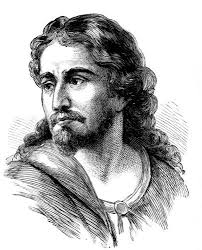 Saint Matthias the Apostle
Saint Matthias the Apostle
Matthias replaced Judas Iscariot (the betrayer of Christ who
hanged himself) as the twelfth Apostle of Christ (Acts 1:26). It is believed by
most that Matthias was one of the seventy that Christ sent out during his
earthly ministry (Luke 10:1). This qualifies him to be an apostle. Matthias, of
which the least is known, is said by Eusebius to have preached in Ethiopia. He
was later stoned while hanging upon a cross...
Date of Martyrdom: 80 A.D...
Feastday: May 14 (Roman Catholic Church, Anglican
Communion); August 9 (Eastern Orthodox Churches)..
Matthias, according to the Acts of the Apostles, was the
apostle chosen by the remaining eleven apostles to replace Judas Iscariot
following Judas' betrayal of Jesus and suicide... His calling as an apostle is
unique in that his appointment was not made personally by Jesus, who had
already ascended to heaven, and, it was made before the descending of the Holy
Spirit upon the early Church...
Not that they became apostles through being chosen for
some distinguished peculiarity of nature, since also Judas was chosen along
with them. But they were capable of becoming apostles on being chosen by Him
who foresees even ultimate issues. Matthias, accordingly, who was not chosen
along with them, on showing himself worthy of becoming an apostle, is
substituted for Judas...
Faith without works is dead...
"But now Faith, Hope, Love, abide these three ; but
the greatest of these is Love." 1
Corinthians 13:13, Bible
 Dvylika apaštalų
Dvylika apaštalų
"Dvylikos apaštalų vardai: pirmasis Simonas,
vadinamas Petru, ir jo brolis Andriejus; Zebediejaus sūnus Jokūbas ir jo brolis
Jonas; Pilypas ir Baltramiejus; Tomas ir muitininkas Matas; Alfiejaus sūnus
Jokūbas ir Lebėjus, vadinamas Tadu; Simonas Kananietis ir Judas Iskarijotas,
kuris išdavė Jėzų.." Mato 10,2-4, Biblija
Apaštalai ( pasiuntiniai) – 12 pirmųjų Jėzaus Kristaus
pasirinktų mokinių, kuriuos jis siuntė skelbti pasauliui apie save ir savo
mokymą...
Dvylika Biblijoje minimi apaštalų: Andriejus,
Baltramiejus, Jokūbas Jaunesnysis, Jokūbas Vyresnysis, Jonas, Judas Iskariotas
– apaštalas, išdavęs Jėzų, Matas, Pilypas, Simonas Kananietis, Simonas Petras –
laikomas pirmuoju popiežiumi katalikybėje, Tadas, Tomas...
 Apaštalas Andriejus ( taip pat žinomas kaip
Andriejus pirmas pašauktas) – vienas iš Jėzaus Kristaus mokinių, apaštalas,
Apaštalo Petro brolis... Apaštalas Andriejus mirė kankinio mirtimi ant raidės „X“
formos kryžiaus (Andriejaus kryžius), apie 70 m. Graikijos Patrų mieste... Apaštalo Andriejaus minėjimo data lapkričio 30 d...
Apaštalas Andriejus ( taip pat žinomas kaip
Andriejus pirmas pašauktas) – vienas iš Jėzaus Kristaus mokinių, apaštalas,
Apaštalo Petro brolis... Apaštalas Andriejus mirė kankinio mirtimi ant raidės „X“
formos kryžiaus (Andriejaus kryžius), apie 70 m. Graikijos Patrų mieste... Apaštalo Andriejaus minėjimo data lapkričio 30 d...
 Apaštalas Baltramiejus ( mirė apie 70 m.) – vienas iš
dvylikos apaštalų, Naujajame Testamente minimas tik apaštalų
sąrašuose...Manoma, kad Evangeljose minimas Baltramiejus ir Evangelijoje pagal Joną minimas Natanaelis
yra vienas ir tas pats asmuo... Šventojo Baltramiejaus diena Katalikų bažnyčioje minima
rugpjūčio 24 d., Rytų bažnyčiose – birželio 11 d. Armėnų apaštališkoji bažnyčia
Šventąjį Baltramiejų, kartu su šventuoju Tadu laiko savo globėjais. Koptų bažnyčia
šv. Baltramiejų mini sausio 1 d...
Apaštalas Baltramiejus ( mirė apie 70 m.) – vienas iš
dvylikos apaštalų, Naujajame Testamente minimas tik apaštalų
sąrašuose...Manoma, kad Evangeljose minimas Baltramiejus ir Evangelijoje pagal Joną minimas Natanaelis
yra vienas ir tas pats asmuo... Šventojo Baltramiejaus diena Katalikų bažnyčioje minima
rugpjūčio 24 d., Rytų bažnyčiose – birželio 11 d. Armėnų apaštališkoji bažnyčia
Šventąjį Baltramiejų, kartu su šventuoju Tadu laiko savo globėjais. Koptų bažnyčia
šv. Baltramiejų mini sausio 1 d...
 Apaštalas Jokūbas jaunesnysis – vienas iš 12 Jėzaus Kristaus
apaštalų. Minimas visose keturiose evangelijose. Kartais tapatinamas su
Apaštalu Jokūbu teisinguoju...Pagal tradiciją laikoma, kad Apaštalas Jokūbas
jaunesnysis mirė kankinio mirtimi – buvo nukryžiuotas Ostrakino mieste
žemutiniame Egipte... Mirė: apie 62 m... minėjimo data gegužės 3 d...
Apaštalas Jokūbas jaunesnysis – vienas iš 12 Jėzaus Kristaus
apaštalų. Minimas visose keturiose evangelijose. Kartais tapatinamas su
Apaštalu Jokūbu teisinguoju...Pagal tradiciją laikoma, kad Apaštalas Jokūbas
jaunesnysis mirė kankinio mirtimi – buvo nukryžiuotas Ostrakino mieste
žemutiniame Egipte... Mirė: apie 62 m... minėjimo data gegužės 3 d...
 Apaštalas Jokūbas vyresnysis – vienas iš 12 Jėzaus Kristaus mokinių,
apaštalas... Jokūbas gimė Palestinoje, užmuštas 44 m. Jeruzalėje. Jo vyresnis
brolis buvo Apaštalas Jonas evangelistas... minėjimo data liepos 25-ąją (
anksčiau rugpjūčio 5-ąją)... Pagal legendą jo palaikai buvo perkelti į Ispaniją į
Santjago de Compostela miestą .XI a. kelionės į Santjagą įgavo antrą
pagal reikšmę piligrimystės vietą po kelionių į Šventąją žemę...
Apaštalas Jokūbas vyresnysis – vienas iš 12 Jėzaus Kristaus mokinių,
apaštalas... Jokūbas gimė Palestinoje, užmuštas 44 m. Jeruzalėje. Jo vyresnis
brolis buvo Apaštalas Jonas evangelistas... minėjimo data liepos 25-ąją (
anksčiau rugpjūčio 5-ąją)... Pagal legendą jo palaikai buvo perkelti į Ispaniją į
Santjago de Compostela miestą .XI a. kelionės į Santjagą įgavo antrą
pagal reikšmę piligrimystės vietą po kelionių į Šventąją žemę...
 Apaštalas Jonas – vienas iš 12 apaštalų,
Evangelijos pagal Joną, Apreiškimo knygos ir trijų laiškų, įeinančių į Naująjį
Testamentą autorius... Apaštalas Jonas ypatingai buvo mėgiamas Jėzaus už visišką
nuolankumą ir vaikišką sielos tyrumą. Po savo pašaukimo Jonas nesiskyrė su savo
gelbėtoju ir buvo vienu iš trijų mokinių, kuriuos Jėzus ypatingai mylėjo ir
būdamas ant kryžiaus nurodė rūpintis Marija... Apaštalas Jonas gyveno daugiau kaip 100 metų ir mirė sava
mirtimi nuo senatvės, tuo tarpu visi kiti apaštalai mirė kankinio mirtimis...
Apaštalas Jonas – vienas iš 12 apaštalų,
Evangelijos pagal Joną, Apreiškimo knygos ir trijų laiškų, įeinančių į Naująjį
Testamentą autorius... Apaštalas Jonas ypatingai buvo mėgiamas Jėzaus už visišką
nuolankumą ir vaikišką sielos tyrumą. Po savo pašaukimo Jonas nesiskyrė su savo
gelbėtoju ir buvo vienu iš trijų mokinių, kuriuos Jėzus ypatingai mylėjo ir
būdamas ant kryžiaus nurodė rūpintis Marija... Apaštalas Jonas gyveno daugiau kaip 100 metų ir mirė sava
mirtimi nuo senatvės, tuo tarpu visi kiti apaštalai mirė kankinio mirtimis...
 Apaštalas Matas – vienas iš Jėzaus Kristaus
apaštalų. Pagal Naująjį Testamentą buvo muitininkas iš Kafarnaumo, vėliau tapo
apaštalu. Jam priskiriama pirmosios evangelijos autorystė... Apie tolimesnę Mato gyvenimą beveik nieko nežinoma. Pagal
vienus šaltinius jis skelbė evangeliją Etiopijoje, kur ir buvo nukankintas, pagal kitus šaltinius jam buvo įvykdyta
mirties bausmė Mažojoje Azijoje Ieralopio mieste (60-70 m)... Italijos mieste
Salerno San-Matteo bazilikoje saugomi jo palaikai, pagal vieną versiją jie buvo
atvežti į Italiją X a... Minėjimo diena
pas katalikus yra rugsėjo 21 d., pas stačiatikius – lapkričio 16 d...
Apaštalas Matas – vienas iš Jėzaus Kristaus
apaštalų. Pagal Naująjį Testamentą buvo muitininkas iš Kafarnaumo, vėliau tapo
apaštalu. Jam priskiriama pirmosios evangelijos autorystė... Apie tolimesnę Mato gyvenimą beveik nieko nežinoma. Pagal
vienus šaltinius jis skelbė evangeliją Etiopijoje, kur ir buvo nukankintas, pagal kitus šaltinius jam buvo įvykdyta
mirties bausmė Mažojoje Azijoje Ieralopio mieste (60-70 m)... Italijos mieste
Salerno San-Matteo bazilikoje saugomi jo palaikai, pagal vieną versiją jie buvo
atvežti į Italiją X a... Minėjimo diena
pas katalikus yra rugsėjo 21 d., pas stačiatikius – lapkričio 16 d...
 Apaštalas Pilypas – vienas iš 12 Jėzaus Kristaus
apaštalų. Evangelijoje pagal Joną nurodoma, kad jis gimė Betsaidoje, tame
pačiame mieste kaip ir Apaštalas Andriejus ir Apaštalas Petras ir pašauktas su
jais trečiu. Apaštalas Pilypas Jėzui Kristui atvedė Apaštalą Baltramiejų (Jn 1,
43-46). Evangelijoje pagal Joną Pilypas pasirodo dar tris kartus: jis kalbasi
su Jėzumi apie duoną daugybei žmonių... 54 m., valdant Romos imperatoriui
Domicianui, už tikėjimo skelbimą buvo
nukryžiuotas žemyn galva Hirapoliso mieste, Mažojoje Azijoje...minėjimo diena
gegužės 3 d...
Apaštalas Pilypas – vienas iš 12 Jėzaus Kristaus
apaštalų. Evangelijoje pagal Joną nurodoma, kad jis gimė Betsaidoje, tame
pačiame mieste kaip ir Apaštalas Andriejus ir Apaštalas Petras ir pašauktas su
jais trečiu. Apaštalas Pilypas Jėzui Kristui atvedė Apaštalą Baltramiejų (Jn 1,
43-46). Evangelijoje pagal Joną Pilypas pasirodo dar tris kartus: jis kalbasi
su Jėzumi apie duoną daugybei žmonių... 54 m., valdant Romos imperatoriui
Domicianui, už tikėjimo skelbimą buvo
nukryžiuotas žemyn galva Hirapoliso mieste, Mažojoje Azijoje...minėjimo diena
gegužės 3 d...
 Apaštalas Simonas Kananietis (mirė apie 74 m.) – apaštalas,
pasak Biblijos, vienas iš Jėzaus Kristaus mokinių.. Apokrifiniuose šaltiniuose
teigiama, jog apaštalas Simonas Kananietis pamokslavo Judėjoje, Egipte ir
Libijoje. Po Jėzaus Kristaus kartu su Apaštalu Tadu Judu patraukęs pamokslauti
Persijoje ir Babilone... Pagal legendą apaštalas mirė kankinio mirtimi prie Juodosios
jūros Kaukaze – buvo gyvas perpjautas pjūklu... minėjimo diena spalio 28 d...
Apaštalas Simonas Kananietis (mirė apie 74 m.) – apaštalas,
pasak Biblijos, vienas iš Jėzaus Kristaus mokinių.. Apokrifiniuose šaltiniuose
teigiama, jog apaštalas Simonas Kananietis pamokslavo Judėjoje, Egipte ir
Libijoje. Po Jėzaus Kristaus kartu su Apaštalu Tadu Judu patraukęs pamokslauti
Persijoje ir Babilone... Pagal legendą apaštalas mirė kankinio mirtimi prie Juodosios
jūros Kaukaze – buvo gyvas perpjautas pjūklu... minėjimo diena spalio 28 d...
 Apaštalas Simonas Petras ( m. 64 m.) – apaštalas, Romos
katalikų bažnyčios laikomas pirmuoju popiežiumi (32–64 m.)... Pagal evangeliją tikrasis Petro vardas buvo
Simonas, Jono sūnus; teigiama, kad jis buvęs žvejys iš Kafarnaumo Galilėjoje.
Katalikai ir stačiatikiai laiko apaštalą Petrą šventuoju. Jam yra priskiriama
dviejų laiškų, įtrauktų į Naujojo testamento kanoną, autorystė... Bažnytinė
tradicija skelbia, kad Petras mirė Romoje, Vatikano kalne, kankinio mirtimi ant
kryžiaus. Nukryžiuotas, jo prašymu, galva žemyn, nes manė nesąs vertas mirti
taip, kaip Kristus. Vėliau toje vietoje pastatyta bažnyčia, kurioje palaidotas
jo kūnas. Dabar ten stovi Vatikano bazilika... Birželio 29 d. – šventųjų Petro
ir Povilo šventė ...
Apaštalas Simonas Petras ( m. 64 m.) – apaštalas, Romos
katalikų bažnyčios laikomas pirmuoju popiežiumi (32–64 m.)... Pagal evangeliją tikrasis Petro vardas buvo
Simonas, Jono sūnus; teigiama, kad jis buvęs žvejys iš Kafarnaumo Galilėjoje.
Katalikai ir stačiatikiai laiko apaštalą Petrą šventuoju. Jam yra priskiriama
dviejų laiškų, įtrauktų į Naujojo testamento kanoną, autorystė... Bažnytinė
tradicija skelbia, kad Petras mirė Romoje, Vatikano kalne, kankinio mirtimi ant
kryžiaus. Nukryžiuotas, jo prašymu, galva žemyn, nes manė nesąs vertas mirti
taip, kaip Kristus. Vėliau toje vietoje pastatyta bažnyčia, kurioje palaidotas
jo kūnas. Dabar ten stovi Vatikano bazilika... Birželio 29 d. – šventųjų Petro
ir Povilo šventė ...
 Apaštalas Judas Tadas – pagal Naująjį Testamentą,
Alfiejaus ir Marijos sūnus, apaštalo Jokūbo jaunesniojo brolis... Pasak legendų,
apaštalas Judas Tadas skelbė tikėjimą Palestinoje, Avarijoje, Sirijoje ir
Mesopotamijoje ir mirė kankinio mirtimi Armėnijoje antroje I a. pusėje (72 ) ...
Apaštalo Judo Tado šventė spalio 28 d....
Apaštalas Judas Tadas – pagal Naująjį Testamentą,
Alfiejaus ir Marijos sūnus, apaštalo Jokūbo jaunesniojo brolis... Pasak legendų,
apaštalas Judas Tadas skelbė tikėjimą Palestinoje, Avarijoje, Sirijoje ir
Mesopotamijoje ir mirė kankinio mirtimi Armėnijoje antroje I a. pusėje (72 ) ...
Apaštalo Judo Tado šventė spalio 28 d....
 Apaštalas Tomas – vienas iš Jėzaus Kristaus
mokinių... Biblijoje nurodoma, kad jo nebuvo, kai Kristus prisikėlė iš
numirusių ir pasirodė apaštalams. Kai vėliau Tomui apie tai buvo papasakota,
jis pareiškė tuo netikįs ir patikėsiąs tik tada, kai pats pamatysiąs ir
paliesiąs jo žaizdas. Kai Jėzus pasirodė ir paprašė netikintį Tomą, kad jis
pirštu paliestų jo žaizdas, priblokštas Tomas pasakė: "Mano Viešpats ir
mano Dievas."... Tomas mirė kankinio mirtimi Kalaminoje, Indijoje,
nužudytas ietimi ar strėle (72 m.). Jo karstas yra po altoriumi Madraso
katedroje netoli Bengalijos įlankos. Jo kūnas nežinomomis aplinkybėmis III a.
buvo pervežtas į Edesą (dabar Urfa Turkijoje) Mažojoje Azijoje... Jo šventė yra
liepos 3 d...
Apaštalas Tomas – vienas iš Jėzaus Kristaus
mokinių... Biblijoje nurodoma, kad jo nebuvo, kai Kristus prisikėlė iš
numirusių ir pasirodė apaštalams. Kai vėliau Tomui apie tai buvo papasakota,
jis pareiškė tuo netikįs ir patikėsiąs tik tada, kai pats pamatysiąs ir
paliesiąs jo žaizdas. Kai Jėzus pasirodė ir paprašė netikintį Tomą, kad jis
pirštu paliestų jo žaizdas, priblokštas Tomas pasakė: "Mano Viešpats ir
mano Dievas."... Tomas mirė kankinio mirtimi Kalaminoje, Indijoje,
nužudytas ietimi ar strėle (72 m.). Jo karstas yra po altoriumi Madraso
katedroje netoli Bengalijos įlankos. Jo kūnas nežinomomis aplinkybėmis III a.
buvo pervežtas į Edesą (dabar Urfa Turkijoje) Mažojoje Azijoje... Jo šventė yra
liepos 3 d...
 Judas Iskariotas –
vienas iš Jėzaus mokinių... Judo vardas yra virtęs išdaviko sinonimu. Apkabinimu/bučiniu Judas
Iskariotas romėnams nurodė Jėzų ir už tai gavo piniginį atlygį, “30 sidabrinių“...
Naujojo Testamento evangelijos šį Judo veiksmą traktuoja kaip išdavystę, vėliau
dėl išdavystės Judas pasikorė... Tačiau 1970 m. Egipte rastas gnostikų rankraštis "Judo
Evangelija". „Judo Evangelija“ buvo parašyta iki 180 m., nes tais metais
Liono vyskupas Šv. Iranėjus mini Judo evangeliją kaip vieną iš erezijų...
Judas Iskariotas –
vienas iš Jėzaus mokinių... Judo vardas yra virtęs išdaviko sinonimu. Apkabinimu/bučiniu Judas
Iskariotas romėnams nurodė Jėzų ir už tai gavo piniginį atlygį, “30 sidabrinių“...
Naujojo Testamento evangelijos šį Judo veiksmą traktuoja kaip išdavystę, vėliau
dėl išdavystės Judas pasikorė... Tačiau 1970 m. Egipte rastas gnostikų rankraštis "Judo
Evangelija". „Judo Evangelija“ buvo parašyta iki 180 m., nes tais metais
Liono vyskupas Šv. Iranėjus mini Judo evangeliją kaip vieną iš erezijų...
 Apaštalas Motiejus - vienas iš Jėzaus Kristaus
mokinių.... Motiejus (I a.) buvo apaštalu išrinktas vietoje Jėzaus išdaviko
Judo (Apd 1, 15-26). Rinkimuose buvo du kandidatai: Juozapas Barsabas ir
Motiejus. Pasimeldę išrinko Motiejų. Jis buvo liudininkas Jėzaus krikšto
Jordano upėje, jo įžengimo į dangų ir prisikėlimo. kartu su kitais apaštalais
jis per Sekmines gavo Šv. Dvasią. Sunku nustatyti vietoves ar laiką, kur jis
apaštalavo. Teigiama, kad iš pradžių jis veikė Judėjoje, vėliau Kapadokijoje ir
netoli Kaspijos jūros. Etiopijos tradicija ir netikri Andriejaus ir Motiejaus
"darbai" teigia, kad jis darbavosi tuose kraštuose, Kanibalso mieste.
Legenda pasakoja, kad jis miręs prikaltas prie kryžiaus ( 80 m). Imperatoriaus
Konstantino motina šv. Elena apaštalo Motiejaus relikvijas atgabeno į Romą. ... šventė gegužės 14 d..
Apaštalas Motiejus - vienas iš Jėzaus Kristaus
mokinių.... Motiejus (I a.) buvo apaštalu išrinktas vietoje Jėzaus išdaviko
Judo (Apd 1, 15-26). Rinkimuose buvo du kandidatai: Juozapas Barsabas ir
Motiejus. Pasimeldę išrinko Motiejų. Jis buvo liudininkas Jėzaus krikšto
Jordano upėje, jo įžengimo į dangų ir prisikėlimo. kartu su kitais apaštalais
jis per Sekmines gavo Šv. Dvasią. Sunku nustatyti vietoves ar laiką, kur jis
apaštalavo. Teigiama, kad iš pradžių jis veikė Judėjoje, vėliau Kapadokijoje ir
netoli Kaspijos jūros. Etiopijos tradicija ir netikri Andriejaus ir Motiejaus
"darbai" teigia, kad jis darbavosi tuose kraštuose, Kanibalso mieste.
Legenda pasakoja, kad jis miręs prikaltas prie kryžiaus ( 80 m). Imperatoriaus
Konstantino motina šv. Elena apaštalo Motiejaus relikvijas atgabeno į Romą. ... šventė gegužės 14 d..
Tikėjimas be darbų yra negyvas...
"Taigi dabar pasilieka Tikėjimas, Viltis ir Meilė -
šis trejetas, bet didžiausia jame yra
Meilė." 1 Korintiečiams 13-13, Biblija
 The Book of Wisdom, often referred to simply as Wisdom or
the Book of the Wisdom of Solomon, is one of the deuterocanonical books of the
Bible. It is one of the seven Sapiential or wisdom books of the Septuagint Old
Testament, which includes Job, Psalms, Proverbs, Ecclesiastes, Song of Solomon
(Song of Songs), and Sirach...
The Book of Wisdom, often referred to simply as Wisdom or
the Book of the Wisdom of Solomon, is one of the deuterocanonical books of the
Bible. It is one of the seven Sapiential or wisdom books of the Septuagint Old
Testament, which includes Job, Psalms, Proverbs, Ecclesiastes, Song of Solomon
(Song of Songs), and Sirach... Wisdom of Solomon
Wisdom of Solomon The Search for Wisdom is Harder .. . “The Book of Job“
The Search for Wisdom is Harder .. . “The Book of Job“ The Book of Job - Poem of Wisdom
The Book of Job - Poem of Wisdom The Search for
Wisdom ...
The Search for
Wisdom ... Poema apie Išmintį
Poema apie Išmintį  Saliamono Išmintis
Saliamono Išmintis Sunkus yra Išminties ieškojimas … “Jobo Knyga“
Sunkus yra Išminties ieškojimas … “Jobo Knyga“
 Jobo
Knyga - Poema apie
Išmintį
Jobo
Knyga - Poema apie
Išmintį Išminties
ieškojimas...
Išminties
ieškojimas...


![[Saint Peter the Apostle]](http://saints.sqpn.com/wp-content/gallery/saint-peter-the-apostle/saint-peter-the-apostle-14.jpg)

![[Saint James the Greater]](http://saints.sqpn.com/wp-content/gallery/saint-james-the-greater/saint-james-the-greater-08.jpg)

![[Saint Philip the Apostle]](http://saints.sqpn.com/saintp21.jpg)





![[Saint Jude Thaddeus]](http://saints.sqpn.com/saintj03.jpg)




